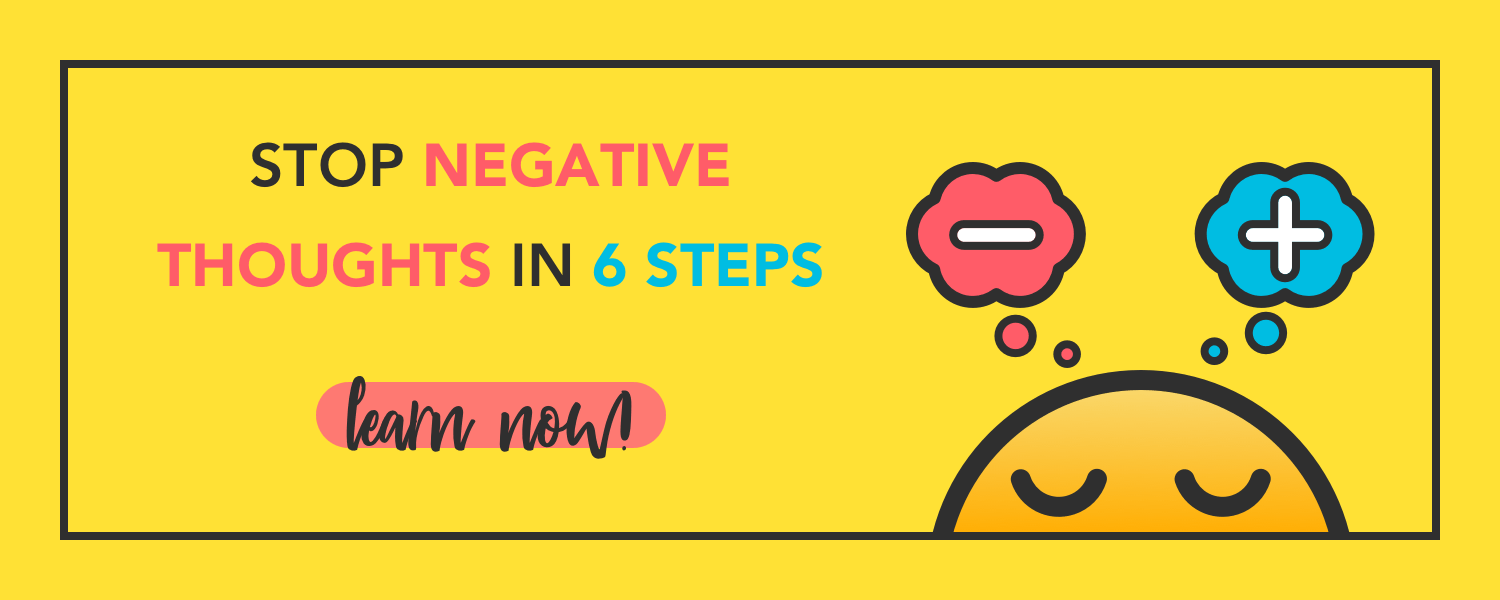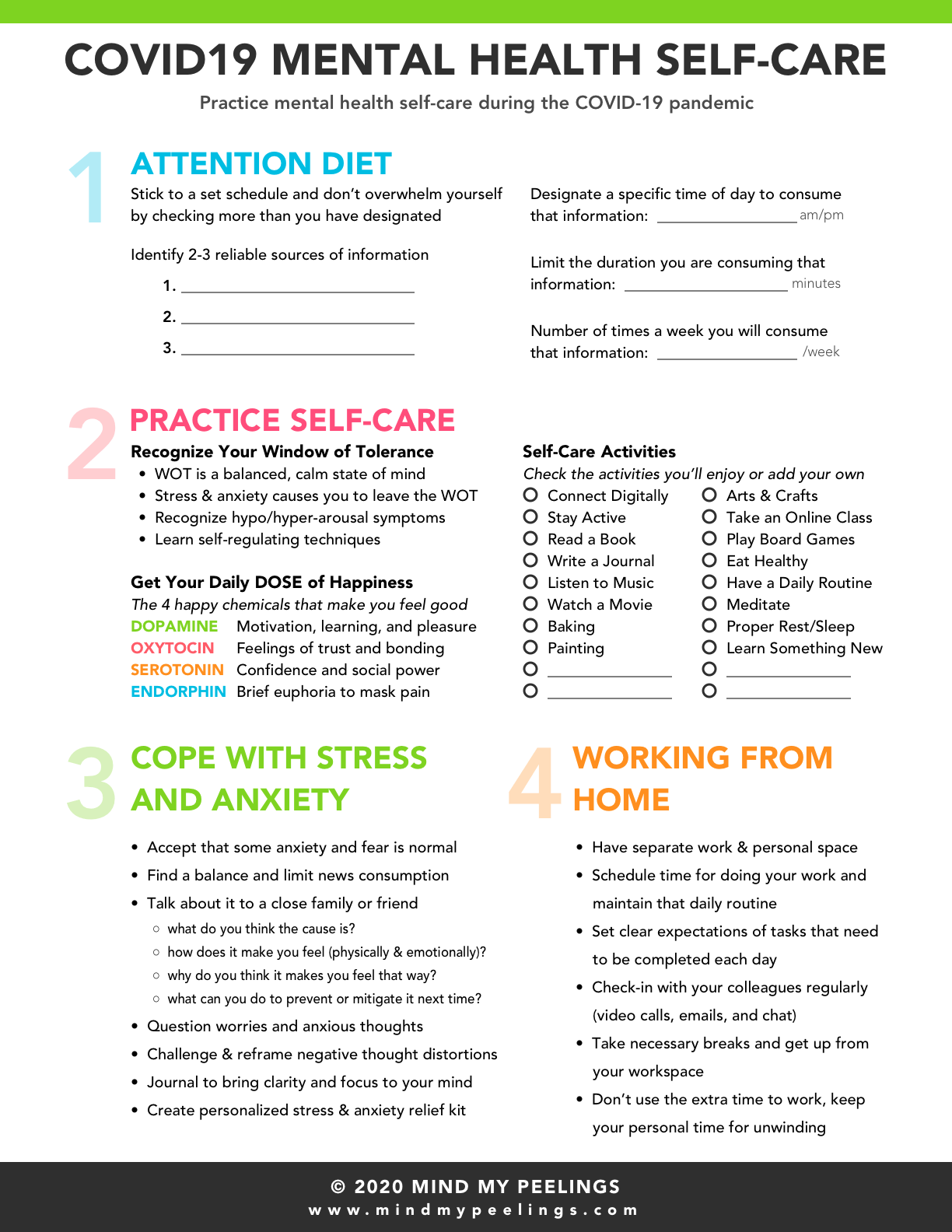Mental Health Self-Care Tips for Stress & Anxiety
Did you know, people with high levels of anxiety increased 314% from before the COVID-19 pandemic started. While high levels of depression increased 217%.
The pandemic has caused a lot of stress and anxiety for everyone of all ages. Especially those with any preexisting mental health conditions. Those accessing mental health services dropped by 53%.
It is more important than ever to take care of our mental health. This guide will give you some tips to remain calm and practice self-care to maintain your mental health.
How the Pandemic Affects You
The outbreak of COVID-19 can be very stressful and cause a lot of fear or anxiety. This fear and anxiety can be overwhelming and cause a lot of unfamiliar emotions for both adults and children.
People who may respond more strongly to the crisis:
Elderly people and people with chronic diseases
Children and teenagers
Front line responders (doctors, other health care providers, and first responders)
People who have preexisting mental health conditions or substance abuse problems
Most people will know at least one of the above. Therefore, it important to remain calm and support those who are at risk of the stress and anxiety created during this crisis.
Some common signs that stress or anxiety is having an impact:
Excessive fear or worry about your health and the health of loved ones
Changes in sleep or eating patterns
Difficulty focusing or concentrating
Worsening of chronic health problems
Increase substance use (such as alcohol, tobacco, or other drugs)
Pay attention to your thoughts, behaviors, and emotions during this time. Being aware of any negative changes is critical to managing your mental health.
If you’re not familiar with your symptoms, you can identify them with this awareness worksheet.
People with preexisting mental health conditions or substance abuse problems should do the following:
Continue with your existing treatment program/medication
Monitor your symptoms closely and be aware of any changes
Talk to your psychologist, therapist, or counselor for any advice
Take breaks from watching, reading, or listening to the news stories and social media about the pandemic
Listen to the Experts
The first step and most important step is to listen to the experts in your country. It is important to follow the advice of medical professionals.
The advice you will receive from your government will help protect you and those around you who are most vulnerable.
There is a lot of misinformation being spread through social media and the internet. Avoid unfamiliar news and social media links.
Get the information directly from the source instead:
Medical Professionals within the Government
Airlines/Airport for flight information & cancellation
Local Shops (Grocery Stores/Pharmacies) for adjusted hours or closures
Local News for specific updates in your city/town
Take Care of Your Mental Health
It is important to maintain our mental health during this difficult time. We must continue to practice self-care to ensure our well-being.
Attention Diet
There is a lot of information out there covering the pandemic. By limiting our consumption of all the information we can better understand what is happening and make the right decisions.
Identify 2-3 reliable sources of information
Designate a specific time of day to consume that information through news, social media, radio, etc.
Limit the amount of time you are consuming that information
Stick to your schedule and don’t overwhelm yourself by checking more than you have designated
Practice Self Care
Recognize Your Window of Tolerance
The window of tolerance is where you are in a balanced and calm state of mind. This is where you can function most effectively and respond to the demands and stress of everyday life without much difficulty.
Undue stress and anxiety can cause you to leave your window of tolerance or dysregulate where you will experience symptoms of hyperarousal or hypoarousal.
By recognizing these symptoms you experience, you can take action to self-regulate and bring yourself back into the window of tolerance. Download the worksheet to identify your symptoms first.
Get Your Daily DOSE of Happiness
When you feel good, your brain is releasing one of the happiness chemicals. There are four happiness chemicals, which are known as DOSE:
Dopamine: motivation, learning, and pleasure
Oxytocin: feeling of trust, motivates you to build and sustain relationships
Serotonin: feeling significant or important
Endorphin: brief euphoria that masks physical pain
Each of the happiness chemicals has a job to do. By understanding how these chemicals work and what causes each to be released, we can improve our overall happiness levels.
Build Resilience
Focus on what you can control and accept what is out of your control
Embrace change by taking a flexible approach and looking at the opportunities
Maintain a positive attitude by embracing both positives and negatives in any situation
Connecting with others to share feelings, discuss problems, and support each other
Self-Care Activities
Connect with others digitally such as a phone call, video calling, or texting
Stay active by doing indoor exercises such as body workouts, using stairs, treadmill, or indoor bike
Read a book
Write a journal entry
Watch a movie or tv show
Learn a new hobby such as cooking, painting, crafts
Take an online course and learn a new skill
Play board games or video games with friends and family
Eat healthy by choosing more fruits and vegetables and drinking lots of water
Keep a regular daily routine as much as possible
Unwind by doing breathing exercises or meditation
Get proper rest and sleep
Avoid substance abuse such as alcohol, tobacco, or drugs
Coping with Stress and Anxiety
The pandemic can cause a lot of stress and anxiety because it disrupts normal life for many people. For some it can trigger a downward spiral that brings out the worst of your mental illness. Here are some ways to relieve that stress and anxiety.
Dealing with Worries and Anxious Thoughts
Worries and anxious thoughts can leave you overwhelmed, fatigued, and unproductive. Work through your worries and anxious thoughts by questioning them.
Questioning the worry will help you understand that your worries and anxious thoughts are mostly unrealistic. Learn how to question your worries and anxious thoughts.
Challenge Negatives Thoughts
All the stress and anxiety can create negativity which leads to distorted thought patterns such as polarized thinking, overgeneralization, or even catastrophizing.
If you experience negative thinking traps, I recommend learning to challenge and reframe your negative thoughts. You can do so with this simple and easy to understand worksheet.
Talking with Someone
Talk to someone about what you’re thinking about. Express your emotions and thoughts to someone close to you. You will find comfort when someone is listening to you. Try to identify:
what the cause could be
how does it make you feel (feelings/emotions, physical symptoms, and wherein the body you feel it)
why do you think it makes you feel that way
what can you do to prevent or mitigate the stress or anxiety
It can be challenging to describe your anxiety to someone who doesn’t have it. Learn more about how to explain your anxiety to someone who doesn’t struggle with it.
Talking also helps process your thoughts and emotions in a positive way. This allows you to clear your mind and focus your thoughts which helps calm the stress and anxiety.
Journaling
Journaling is a great tool for dealing with stress and anxiety. When you write, it helps clear your thoughts and emotions. Having an outlet for that mental clutter will bring clarity and focus to your mind.
When you have that clarity, it helps calm the stress and anxiety you might have. Here are some great tips to get started with journaling.
Stress and Anxiety Relief Kit
A stress and anxiety relief kit is a collection of physical objects, reminders, or activities to help you remain calm when you experience any undue stress or anxiety.
It is small and personalized to your needs so you can carry it with you when you’re away from home or have it ready to go somewhere in your home. Learn to create your own personalized relief kit today.
Additional Coping Tips
Try to focus on the things you can control and plan for what you can’t control to be prepared when it happens
Accept that some anxiety and fear is normal
Find a balance and limit yourself from watching, reading, or listening to news stories about the pandemic (this includes social media)
Seek support from a family, friend, or professional
Working From Home
Here are some tips for working from home so you can maintain that productivity while keeping your mental health in check:
Have a separate workspace and personal space
Set a scheduled time for doing your work and maintain that daily routine
Set clear expectations of tasks that need to be completed each day
Check-in with your colleagues regularly (video calls, emails, and chat)
Take necessary breaks and get up from your workspace
Don’t use the extra time to work, keep your personal time for unwinding
Dealing With Isolation or Quarantine
One challenge is that the pandemic can disrupt routines. We then stop doing the daily activities we normally do and pick up bad habits. This can include excessive alcohol, tobacco, or drug use.
Here are some tips to maintain our routine and practice self-care.
Stick to Your Normal Routine
Create a schedule that includes work, school, personal time, meals, physical activity, and sleep
Ensure you follow that schedule or routine daily
Do things you normally enjoy doing or try a new hobby
Maintain Social Interactions
Connect with friends and family through FaceTime, phone, or text
Playing online games with people you know
Practice Self-Care
Pay attention to your health and watch for any signs of deterioration of physical, mental, or social health
Continue to practice self-care as it is easy to spend all your time watching tv-shows
Seek help from friends, family, or a professional if you need it
Plan Ahead
Plan food supplies while quarantined (Ask friends or family for help or use a delivery service)
Make sure you have enough of any medications you may need
Keep a list of important numbers such as your doctor or therapist ready for when you need it
COVID-19 Self Care Worksheet
Download a copy of the worksheet to help you take care of your mental health during this pandemic.
Support Children and Teen’s Mental Health
Children and teens will be strongly affected by the pandemic. They may have difficulty with isolation and it can be challenging to support them while at home all day.
How to Support Children and Teens
Children and teens can experience a wide range of strong emotions due to the pandemic that is happening. Younger children may have more difficulty understanding what is happening and why.
Being able to identify when children or teens are experiencing any undue stress and anxiety due to the coronavirus is the first important step.
As a parent who is working from home and trying to home-school while taking care of your children full time can be exhausting. Here is a great article that provides tips on working from home and supporting your children.
Stress in Children and Teens
Pay attention to some of the following signs:
Excessive crying or irritation in younger children
Returning to behavior they have outgrown (toileting accidents or bedwetting)
Excessive worry or sadness
Unhealthy eating or sleeping habits
Irritability and acting out behavior in teens
Poor school performance or avoiding school
Difficulty with attention and concentration
Avoidance of activities they normally enjoy
Unexplained headaches or body pain
Use of alcohol, tobacco, or other drugs
Things Parents Can Do to Support Children and Teens
Talk with your child or teen about COVID-19. Help them understand what it is, what they should be doing, and try to answer any questions they may have.
Reassure your child or teen is safe and let them know it’s okay to be worried or afraid of the virus. Share how you deal with your stress so they can learn to cope with the situation.
Limit your family’s exposure to the news coverage
Keep up with regular routines they would normally do
If schools are closed, create a schedule for learning activities and fun activities you can do as a family (baking, playing board games, indoor exercises)
Be a role model for them by taking breaks, getting plenty of sleep, exercise, and eating well
Connect with your friends and family members that you can’t see in person
Self Care for Children & Teens
Create a schedule and set time for different activities. Give them some choices for some of the activities.
Activities could be done alone and others could be done together as a family:
learning activities/homework
fun and games (baking, crafts, board games)
physical activities
screen time (movies and tv shows)
Mental Health Support for Children and Teens Worksheet
Download a copy of the worksheet for parents to help support their children and teens' mental health during the pandemic.
Start Taking Care of Your Mental Health
The pandemic can cause a lot of undue stress and anxiety, especially those who are at most at risk. It is important to maintain our mental health by continuing self-care activities.
To recap, we can practice self-care during COVID-19 by:
Understand how the pandemic affects you and those around you
Listening to the medical experts
Take care of your mental health
Develop an attention diet plan
Practice self-care
Use coping techniques for stress and anxiety
Plan for isolation or quarantine
Support children or teen’s mental health
Identify symptoms of stress
Support your child or teen
Establish self-care routines for them
Download a free copy of each of the worksheets and start practicing self-care today.







